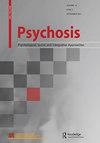尼加拉瓜精神病患者认知行为疗法自助书籍可接受性的定性探索
IF 1
4区 医学
Q4 PSYCHIATRY
Psychosis-Psychological Social and Integrative Approaches
Pub Date : 2021-07-01
DOI:10.1080/17522439.2021.1912814
引用次数: 0
摘要
背景认知行为疗法(CBT)自助干预已成为高收入国家(HIC)支持精神病患者的流行工具。在低收入和中等收入国家(LMIC)背景下,这方面的研究有限。我们报告的结果定性调查的自助书精神病在尼加拉瓜在中美洲。方法从某非政府精神卫生组织(NGO)招募10名自认为有精神病的服务使用者。参与者拿到了一本西班牙语版的英国流行自助书。他们有四周的时间来熟悉这本书。在此之后,我们通过开放式问卷和焦点小组讨论向参与者询问他们对这本书的体验。结果对数据进行归纳性内容分析。对这本书的评价是肯定的。这本书被认为很容易理解。这些练习对应对症状,以及识别和控制复发都很有用。案例研究被认为在减少耻辱和促进自我接受方面是有用的。这些数据强调了尼加拉瓜背景下CBT自助书籍的潜在可接受性。我们建议进一步研究和评估,以建立在这个可接受的信号。本文章由计算机程序翻译,如有差异,请以英文原文为准。
A qualitative exploration of the acceptability of a cognitive behavioural therapy self-help book for people with psychosis in Nicaragua
ABSTRACT Background Cognitive Behavioural Therapy (CBT) self-help interventions have become a popular tool in High-Income Countries (HIC) to support people living with psychosis. There is limited research of this in Low– and Middle-Income Country (LMIC) contexts. We report findings of a qualitative investigation of a self-help book for psychosis in Nicaragua in Central America. Methods Ten service users who self-identified as having psychosis were recruited from a mental health non-governmental organisation (NGO). Participants were given a Spanish version of a popular self-help book developed in the UK. They had four weeks to familiarise themselves with the book. Following this, we asked participants about their experiences of the book via an open ended questionnaire and a focus group discussion. Results We conducted an inductive content analysis on the data. Evaluations of the book were positive. The book was considered easy to understand. The exercises were useful for coping with symptoms, as well as for recognising and managing relapse. Case studies were perceived useful in terms of reducing stigma and promoting self-acceptance. Discussion The data highlight potential acceptability of CBT self-help books in the Nicaraguan context. We make recommendations for further research and evaluation to build on this signal of acceptability.
求助全文
通过发布文献求助,成功后即可免费获取论文全文。
去求助
来源期刊
CiteScore
2.20
自引率
8.30%
发文量
36

 求助内容:
求助内容: 应助结果提醒方式:
应助结果提醒方式:


